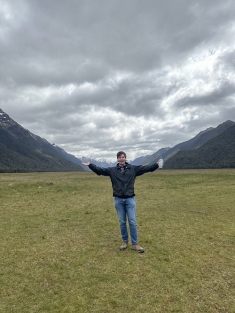Study Abroad in Plant Science
I loved this trip, specifically the hands-on portions, and would definitely recommend it to future students. It broadened my understanding of how sustainability, specifically when it comes to food and agriculture, can be dealt with and how big a role culture plays in that.
Rowan LeVan SEBS'25
Studying abroad is a transformative experience that allows you to expand your knowledge, gain global perspectives, and immerse yourself in different cultures. As a Plant Science major, you have unique opportunities to study the world’s diverse plant ecosystems, agricultural practices, ethnobotanical plant species and modern plant biotechnology. Whether you are interested in sustainable agriculture, horticulture, or environmental conservation, studying abroad can provide you with high impact learning opportunities.
This experience is crucial to your academic and professional growth. You will gain credits towards your degree, and it is a great way to complement your studies. You can take unique courses with significantly different pedagogies. Some courses are unique and provide a foundation of the plant world common within the region. These courses will enhance your knowledge and can give a professional edge through diversity and globalization experiences.
Winter 2025 - Coimbatore, India (11:776:490)
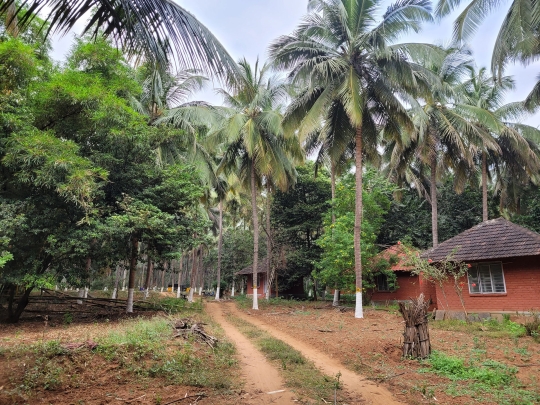

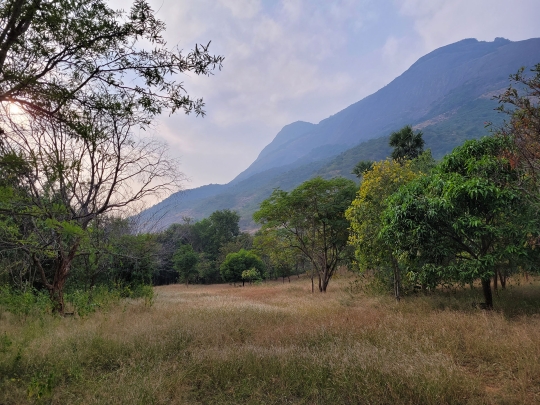

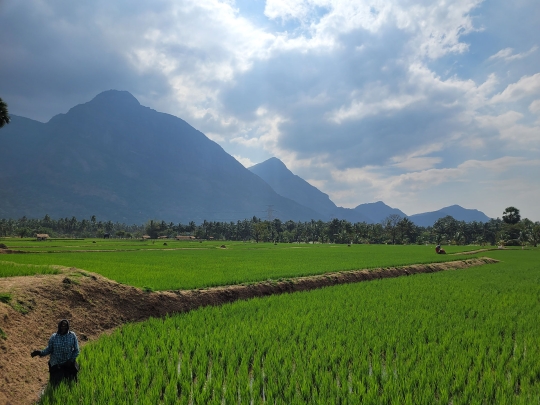
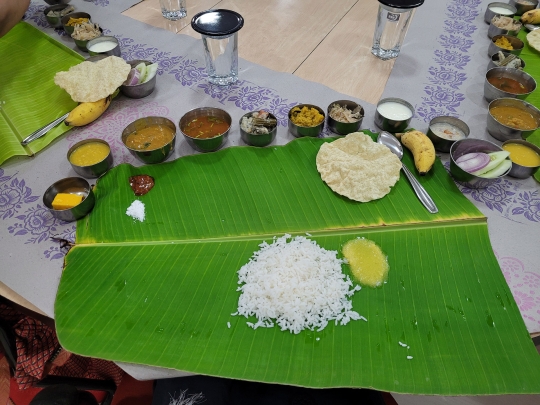
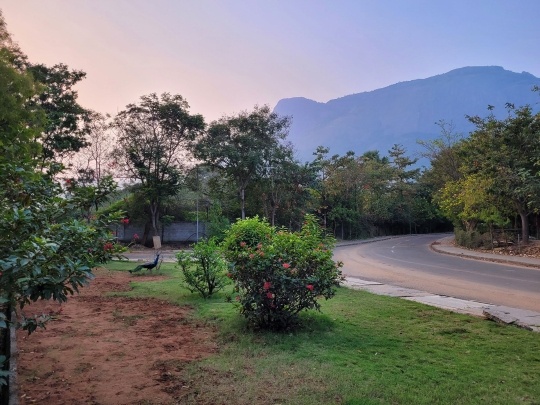
Accordion Content
-
Studying abroad is a possibility but the reality of fitting a study abroad program into your academic journey comes down to early planning. Allow yourself at least one year to prepare for your study abroad experience. Here are a few steps to guide you:
First-Year: Find a program: Explore various programs that align with your academic and career goals through the Rutgers Global.
First-Year or Sophomore Year: Get connected: Attend information sessions and Study Abroad Fairs through the SEBS Office of Global Engagement and Rutgers Global. Connect with former study abroad participants to hear about their experiences and insights. Study Abroad Global Ambassadors are here to help!
Sophomore or Junior Year: Academic Planning and Apply to Programs: Advising sessions with Dr. Patel (Undergraduate Program Director for Plant Science) and the study abroad advisor at the Office of Global Engagement at SEBS is the crucial next step. Consider overall cost of the program and identify scholarships that you may be eligible to apply. There are several scholarships of varying amounts to help offset the total cost. If you intend on studying during your Junior year, you must apply during your sophomore year.
Junior Year: Go Abroad!
Senior Year: If you've missed out on studying abroad during your first three years, explore post-graduation internship opportunities or graduate programs abroad. Talk to SEBS OGE about fully funded post-graduate options, like the Fulbright program.
-
If you're planning a semester-based study abroad, there are several courses equivalent to Rutgers courses. Additionally, you'll find courses that may fulfill the plant science elective category. As you select your coursework, it's crucial to note any prerequisite requirements for the courses you plan to register for and ensure you meet those requirements.
Fulfilling core curriculum requirements is also a good option as you build your semester coursework. This information can be accessed through the course equivalency database.
Advising Checklist: In planning your study abroad experience, you will meet with several advisors to complete the process. You will submit an academic planning form (PDF) that details your course plans and requests approval signatures from each department for course equivalencies.
-
There are two types of study abroad programs in which you can gain credit: The semester long study abroad program and the short-term study abroad program. Opportunities within these programs exist throughout the year including Fall and Spring semesters as well as summer and winter breaks.
-
Financing study abroad is one of the top student concerns but Rutgers Global offers informational sessions to help you understand the costs and explore various funding options. The cost of a study abroad program is dependent on several factors, including the type of program, its duration and location. Rutgers Global provides Worksheets to help you plan out costs and start your budgeting process. Visit Rutgers Global Scholarships to explore funding opportunities to reduce your overall costs. SEBS OGE offers scholarships to SEBS students as well as writing workshops for external study abroad scholarship applications.
Where Can I Study Abroad as a Plant Science Major?
Below are recommended programs currently designed for Plant Science majors. There are several courses that have been approved for the Plant Science major (option dependent) and can count towards your major requirement or plant science elective:
Short-term Programs (Two to Four Weeks)
These programs provide a myriad of advantages for you to gain international experience without committing to a long-term stay. They typically last under four weeks and provide a unique opportunity to explore new cultures, enhance academic learning, and develop valuable skills in a compact timeframe. Many programs have a faculty member who leads a small student cohort. Short term programs can fit easily into your academic schedule during summer, winter and even spring break sessions. Some short term programs also offer hands on experience, such as field work, and can fulfill experiential learning credit required for SEBS students.
- Rooted in Change: Immersive learning for Rural Agro-Food Development in Southern India. Coimbatore, India, (Launch winter 2025) – 11:776:490 (119k PDF)
Application deadline: October 1st 2024
Be part of this inaugural Plant Science program that will broaden your understanding through a blend of cultural immersion, educational exploration, and collaborative student engagement in partnership with Amrita Vishwavidyalaya (Amrita University). You'll engage with faculty and students at the host institution specializing in plant natural products, food, and agriculture. Beyond traditional classroom instruction, you'll visit and experience life in a selected rural village through the host institution's Live in Labs® initiative. Working alongside Amrita University students, you'll delve into local traditions and practices, leveraging your academic experience to craft sustainable solutions for community Agro-Food challenges. Rutgers Faculty: Drs. Nrupali Patel and Chitra Ponnusamy.
- Tropical Environments and Society. Costa Rica (Embedded Spring)
- Human Health and the Metropolis: Tensions and Transformations in Southeast Asia. Bangkok, Thailand (Summer)
- An Exploration of Biodiversity, Natural History, and Conservation of Patagonia (Summer and Winter)
- Galapagos Archipelago. Natural History and the Development of Evolutionary Thinking (Summer)
Semester-based Programs (Academic Year)
These offer you a more in-depth international experience that can impact your academic, personal, and professional life. Because these programs span several months, you can take time to delve into a new culture, develop language skills and engage in extensive coursework and extracurricular activities. The universities below are recommended programs and their curricula are aligned for the Plant Science major which means that you can gain Plant science course credits through equivalencies or electives:
Accordion Content
-
University of Melbourne (Australia)
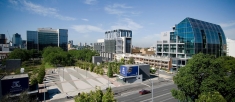
- Gain insights into Australia’s agricultural production industries.
- Enroll in course such as Plant Breeding or Sustainable food systems.
- Discover city parks, visit the National Gallery and explore Scienceworks
- Enjoy delicious meals from around the world at Queen Victoria Market.
- Maybe catch an overnight ferry to Tasmania!
University College Dublin (Ireland)
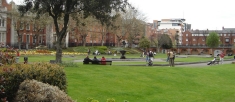
- Study at the School of Agriculture and Food Science, ranked #1 in Ireland and 24th globally.
- Enroll in courses such as Organic Agriculture, Fruit Physiology, or Pest Management.
- Experience the rich culture of Dublin, located on the scenic east coast of Ireland.
University of the West Indies at Cave Hill (Barbados)

- Study the rich diversity of plant ecosystems in this vibrant region.
- Expand your knowledge in tropical horticulture and plants in the Caribbean.
- Visit the Andromeda Botanic Gardens and the Life Science Herbarium.
- Explore the city of Bridgetown with rich cultural foods.
University of Stellenbosch (South Africa)
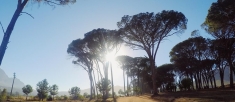
- Study at the Faculty of Agrisciences in the beautiful region of Boland Mountains.
- Take courses in Fruit Production, Citrus Production, Plant Diseases, Soil Science and even Grapevine and Wine sciences.
- Discover Stellenbosch, the heart of South Africa’s renowned wine country.
- Adventure beyond the campus and visit the city of Cape Town to climb the famous Table Mountain.
University of Ghana (Ghana)

- Study relevant agriculture courses that count towards your degree.
- Immerse yourself in local Ghanian culture through on-campus events.
- Explore the city Legon and venture beyond the campus to discover rainforests, parks, and beaches.
University of Bristol (United Kingdom)
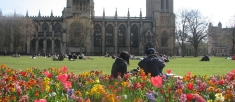
- Join the Biological Science program with specialization in plant studies.
- Take courses in Plant and Sustainable Food production and the Future of the Green Planet
- Be part of a student cohort top rank institution, competing with the likes of Oxford and Cambridge.
- Enjoy exploring Bristol’s restaurants, shops, parks, museums and harborside.
Hebrew University of Jerusalem (Israel)

- Study at The Robert H Smith Faculty of Agriculture, Food and Environment.
- Enroll in Soil Science courses and pest management courses in agriculture.
- Visit the sacred city of Jerusalem and explore the Israel Museum to see the famous Dead Sea Scrolls.
Student reflections about Coimbatore, South India in Winter'25
All of the activities were deeply enriching! I would recommend this program for students in the future. I am trying to put the word out because it is a great program that incorporates Experiential Learning with cultural aspects of Coimbatore. This is something that I think a lot of students will appreciate!
Vishva Gunasingha, Biotechnology and Economics, ’29
I would definitely recommend this program to a friend! Having an educational background in Indian culture, politics, ecology, agriculture, etc., has been my favorite travel experience thus far. Not just visiting but truly learning about the place you are in is invaluable.
Tamar Novik, Environmental Policy, ’25
Student Testimonial - Jeremy Simon (Fall 2023) - Semester-based Program
Location: University of Auckland
-
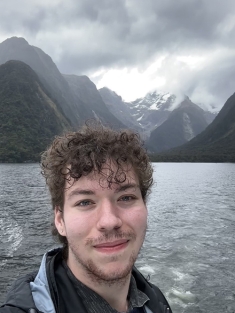
I had spent my Rutgers Fall Semester abroad, which is Semester 2 in Waipapa Taumata Rau (University of Auckland). There was some lingo to learn (such as "papers" referring to "courses", "marks" for "grades", and heaps of te reo Māori mixed into everyday speech), which was a fun cultural exchange. The campus was lush and green (and quite rainy) throughout the winter, and as Spring rolled around in November, the city was blooming with wisteria, rose, mānuka, whau, pōhutukawa, kōwhai, and lots of colorful (albeit invasive) wildflowers. I had the pleasure of diving deeper into Aotearoa's unique Gondwanan flora and fauna in some of my classes, "Plant Diversity and Function" and "Pacific Biogeography and Biodiversity".
My professors at University of Auckland were easygoing and personable, insisting on being referred to by their first names. It was easy to see their passion for maintaining Aotearoa's natural diversity, and I was able to work with a variety of plants that I have never seen before, nor could ever see outside of New Zealand!
The course load was comparable to Rutgers, though classes outside my major were limited due to the structure of their (British-derived) academic framework. I gained skills in using software like Geneious and BioGeoBEARS, which would have been daunting if not for the gracious help of my professors and peers. My semester in New Zealand, the near-antipode of New Jersey, proved invaluable in my education due to the extreme endemism of its plants and animals, and the delicate balance they stride in an increasingly globalized world. -
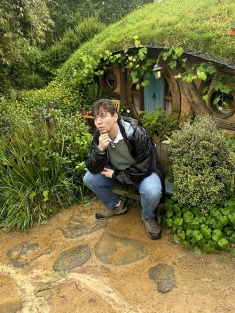
At the near-antipode of the planet, Aotearoa New Zealand presented a very unique, yet quickly familiar, living experience. In a nation with a population nearly half that of New Jersey's, it comes as no surprise that there was less variety in grocery stores or imported goods, though I found that it added to the charm of this sparsely-populated Pacific nation. Auckland is a melting pot of British, Polynesian, and heaps of other cultures, and its vastness lent to so many hidden gems. Ramen shops and pizzerias coexisted with kava bars and Fish & Chips takeaways, with a blend of different architectures and languages. There were also quite a few scenic nature trails nearby that I frequented between classes, a reminder that I was stepping foot on the last major landmass to be settled by humanity.
For a taste of Kiwi life outside Tāmaki Makaurau, I mustered the courage to fly to Queenstown in the South Island, then drove (on the left side of the road!) around Wellington, Taranaki, and Rotorua in the North Island. I found all these places very charming and admired the long winding roads and spectacular views Te Ika-a-Māui had to offer.
New Zealand is by no means the cheapest place to live, nor is it exactly easy to get around without a driver's license, but the natural splendor is unparalleled. These travels were only made sweeter by the friendly, considerate people I had met, who had extended the spirit of manaakitanga to me. My experience through Rutgers Global also made this dream a reality, and I'll never forget the beautiful memories I was able to create because of it.